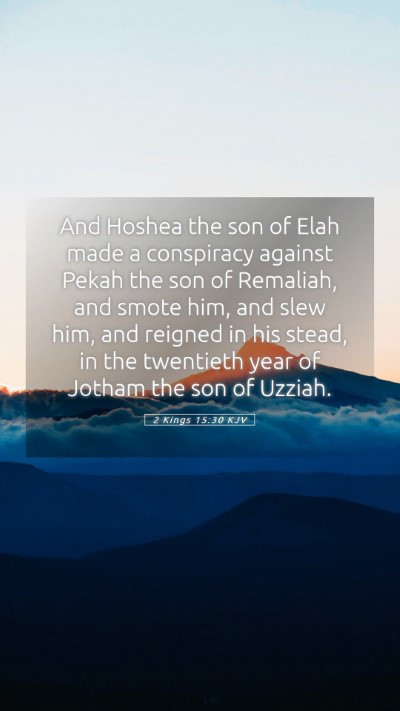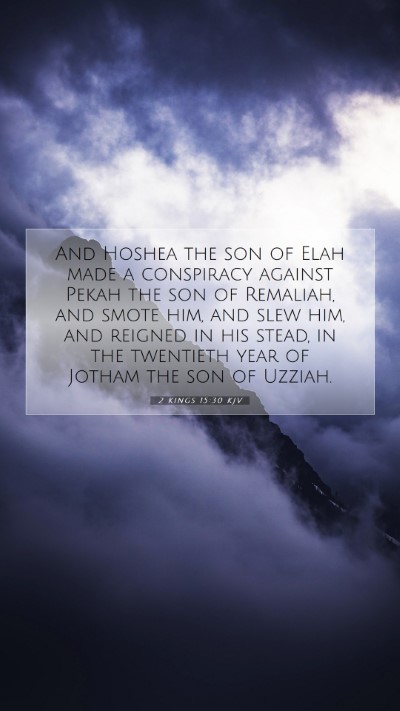Bible Verse Meaning and Commentary for 2 Kings 15:30
Bible Verse: 2 Kings 15:30 - "And Hoshea the son of Elah made a conspiracy against Pekah the son of Remaliah, and smote him, and slew him, and reigned in his stead, in the twentieth year of Jotham the son of Uzziah." (KJV)
Summary of 2 Kings 15:30
This verse illustrates the political turmoil during the reigns of the kings of Israel, focusing on Hoshea's rise to power through conspiracy and violence. Understanding this scripture requires examining the broader historical context and the implications of such political maneuvers on the nation of Israel.
Bible Verse Interpretations
Interpreting biblical verses such as 2 Kings 15:30 involves analyzing the motivations behind the actions of the characters mentioned, their significance within the larger narrative, and their spiritual meanings. Below are insights drawn from several public domain commentaries.
Matthew Henry's Commentary
Matthew Henry emphasizes the importance of divine providence in the events of this verse. He notes that God allows certain rulers to rise with the purpose of fulfilling His plan. Henry suggests that Hoshea's act of conspiracy reflects the moral decline of Israel and their departure from serving Yahweh faithfully. Such a transition in leadership serves as a cautionary tale about the consequences of sin and rebellion against God.
Albert Barnes' Commentary
Albert Barnes provides a historical perspective, highlighting that Hoshea’s assassination of Pekah signifies a shift in governance characterized by instability and conflicts among Israel's leaders. Barnes elucidates that this violence is indicative of a broader pattern of sin and idolatry among the Israelites, which leads to their eventual downfall. He illustrates how this verse captures the cycle of sinful leadership and God's justice.
Adam Clarke's Commentary
Adam Clarke elaborates on the complexities of Hoshea's rise, noting that while his actions may appear politically savvy, they are steeped in moral depravity. Clarke emphasizes Hoshea’s underlying motives for ambition and power, revealing the tragic consequences of such an approach to leadership in the biblical narrative. He warns of the pitfalls of placing trust in human rulers rather than in God.
Insights on the Significance of 2 Kings 15:30
This verse holds significance not only in its historical context but also in its theological implications. It serves as a reminder of the dangers of political ambition devoid of justice and integrity. The rise of Hoshea creates a backdrop for understanding the trajectory of Israel’s disobedience and the impending judgment from God due to their failure to heed His laws.
Key Themes
- Political Intrigue: The conspiracy against Pekah shows the political instability common in Israel’s history.
- Divine Sovereignty: Despite the human actions of leaders, God remains in control over the course of Israel’s history.
- Moral Decline: The actions of Hoshea serve as evidence of Israel's movement away from God’s will.
- Consequences of Sin: Leadership that ignores divine law ultimately leads to national tragedy.
Application of 2 Kings 15:30 in Daily Life
Understanding this verse can provide valuable lessons for modern readers:
- Discernment in Leadership: Seek leaders who adhere to moral and ethical standards grounded in faith.
- Trust in Divine Guidance: Rely on God for wisdom in navigating complex spiritual and political landscapes.
- Awareness of Consequences: Recognize that actions motivated by self-interest rather than justice can have far-reaching repercussions.
Cross References
This verse connects to several other scripture passages, providing a richer understanding of its themes:
- 2 Kings 15:10: Discusses Pekah’s conspiracy against Shallum.
- Isaiah 7:1-2: Provides context about the threats faced by the kingdom during this time.
- Hosea 1:1: Introduces the prophet during the reign of Romans and highlights God's judgment against Israel.
- Isaiah 9:21: Discusses the divisive tensions between Judah and Israel.
- 2 Kings 17:1-23: Further illustrates the decline of Israel and the consequences of turning from God.
Conclusion
2 Kings 15:30 serves as a potent reminder of the interplay between leadership and morality. By engaging in Bible study resources and commentary, believers can deepen their bible verse understanding and glean bible study insights from these ancient texts.
As readers reflect on the meaning of Bible verses like this, they are encouraged to incorporate these lessons into their daily lives and Bible study lessons for better application and spiritual growth.


